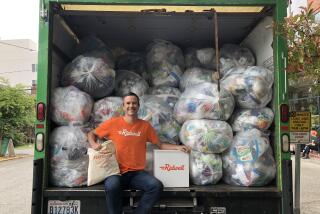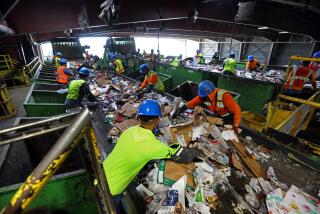THE GOODS : ECONOTES : What Goes Around May Return as a Phone Book
- Share via
The new Pacific Bell directories started arriving in Los Angeles households this week and, though it doesn’t show, both the white pages and the yellow pages are considerably greener.
For one thing, they’re using more recycled paper. The Integrated Waste Management Board in Sacramento reports that of the 112,000 tons of paper used to publish the 1994 directories, nearly 45% is recycled content paper, a huge increase over years past. The board, which oversees the state’s landfills, has commended both Pacific Bell (11.7 million customers in California) and GTE (3.1 million) for helping to divert paper from the landfills.
Being environmentally friendly is new for the phone directory. For the past few years, the book has suffered the paradox of being a major source of consumer information (it’s estimated that approximately 500 people a minute look up something in the yellow pages in Los Angeles County) and a major irritant to environmentalists who deplore the wasted paper.
The issue is particularly sharp in competitive Los Angeles, where as many as six hefty directories a year are deposited on each doorstep by the two phone companies and other commercial publishers.
“Recycling is something we’ve looked at for some time,” says Nancy Swasey, spokeswoman for the Pac Bell directories. Although phone books occupy less than half of 1% of the space in landfills, she said, “it’s still a matter of being this large object that comes to your doorstep, and we didn’t want it to be viewed negatively.”
Over the past few years since forming the Yellow Pages Environmental Network, the publishers have changed the directories by removing the shiny varnish from the covers, substituting nontoxic glues and inks, and working with paper suppliers to add up to 50% of recycled fiber. “There are phone books in the country that are 100% recycled fiber, but it adds so much bulk they’re twice their original size, which defeats the purpose,” Swasey says.
Both Pac Bell and GTE have launched numerous community outreach programs to get the books recycled. The new Pac Bell directories have a toll-free recycling information number printed on the cover.
“It’s been hard for recyclers to sell paper, but that’s changing too,” Swasey says. “Some cities (not Los Angeles) now have curbside programs that sell to our paper supplier Daishowa America in Port Angelus, Wash. They take the books back and we buy the paper from them. That’s really closing the loop.”
They’re also seeking other uses for recycled phone books, Carrie Hyun of GTE says: “Our main mission now is to find companies or businesses (that) will recycle directories into other products. These presently include ceiling tiles, hydro-seeding mulch, paper towels and napkins, and others.”
Roundup
If your summer garden is starting to look frazzled, renew it with compost. The nutrient-rich mix of trimmings, weeds and grass clippings makes the soil better for growing and reduces the need for water. For a complete compost recipe dial (800) 773-CITY. . . . Energy experts from around the world will meet in Pacific Grove from Aug. 30 to Sept. 3 to discuss the latest strides in energy efficiency for residences and businesses. The biennial conference is sponsored by the American Council for an Energy-Efficient Economy. Information: (510) 549-9914.
More to Read
Sign up for our Book Club newsletter
Get the latest news, events and more from the Los Angeles Times Book Club, and help us get L.A. reading and talking.
You may occasionally receive promotional content from the Los Angeles Times.










